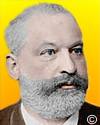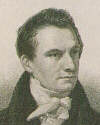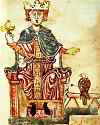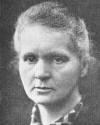 | TODAY IN SCIENCE HISTORY
NEWSLETTER - 26 DECEMBER |
 On 26 Dec 1838, Clemens Alexander Winkler was born, a German chemist who, in 1886, discovered a new element in the mineral argyodite. The chemical processing involved was long and tedious, which makes an interesting read in an excerpt from The Discovery of the Elements by Mary Elvira Weeks. More than just being in the right place at the right time to find out about the interesting mineral, he had the skill and knowledge to pursue the isolation of this new element. One day, reckless with discouragement he... Well, that would be telling! Read for yourself what was the turning point in his efforts. On 26 Dec 1838, Clemens Alexander Winkler was born, a German chemist who, in 1886, discovered a new element in the mineral argyodite. The chemical processing involved was long and tedious, which makes an interesting read in an excerpt from The Discovery of the Elements by Mary Elvira Weeks. More than just being in the right place at the right time to find out about the interesting mineral, he had the skill and knowledge to pursue the isolation of this new element. One day, reckless with discouragement he... Well, that would be telling! Read for yourself what was the turning point in his efforts. |
 On 26 Dec 1791, Charles Babbage was born, an English mathematician who pioneered mechanical computation. Though he was utlimately frustrated in his search for sufficient funding, he made some progress towards building an enormous machine capable of results with greater integrity than calculations by humans. Today's Science Store pick is: The Difference Engine: Charles Babbage and the Quest to Build the First Computer, by Doron Swade, who led a team that built a working model of a Difference Engine, using contemporary materials, in time for Babbage's 1991 bicentenary. It is available New from $7.98. Used from $0.25. (As of time of writing.). On 26 Dec 1791, Charles Babbage was born, an English mathematician who pioneered mechanical computation. Though he was utlimately frustrated in his search for sufficient funding, he made some progress towards building an enormous machine capable of results with greater integrity than calculations by humans. Today's Science Store pick is: The Difference Engine: Charles Babbage and the Quest to Build the First Computer, by Doron Swade, who led a team that built a working model of a Difference Engine, using contemporary materials, in time for Babbage's 1991 bicentenary. It is available New from $7.98. Used from $0.25. (As of time of writing.). | | For picks from earlier newsletters, see the Today in Science History Science Store home page. | |
 | Forging differs from hoaxing, inasmuch as in the later the deceit is intended to last for a time, and then be discovered, to the ridicule of those who have credited it; whereas the forger is one who, wishing to acquire a reputation for science, records observations which he has never made. - Charles Babbage, English mathematician (born 26 Dec 1791).  |
| A scientist's accomplishments are equal to the integral of his ability integrated over the hours of his effort. - Henry Eyring, Mexican-American physical chemist (died 26 Dec 1981).  |
 | The more you learn about the dignity of the gorilla, the more you want to avoid people. - Dian Fossey, American zoologist (died 26 Dec 1985).  |
| Before you look at today's web page, see if you can answer some of these questions about the events that happened on this day. Some of the names are very familiar. Others will likely stump you. Tickle your curiosity with these questions, then check your answers on today's web page. |
 | Clemens Alexander Winkler, born 26 Dec 1838, was a German chemist who discovered a new element that turned out to be the eka-silicon predicted by Dmitry I. Mendeleyev in 1871.
 Which element did Winkler discover? |
 | On 26 Dec 1194, a monarch was born, who made a notable contribution to scientific ornithology was with a six-volume work, De arte venandi cum avibus (c.1244-48). His interest spanned science, especially natural history. He kept a menagerie which at various times had not only monkeys and camels, but also a giraffe and an elephant.
 Where was Frederick II monarch? |
 | Frank Pantridge (1916-2004) was an Irish cardiologist who increased the patient survival rate for those stricken with a heart attack. He equipping ambulances to begin coronary care on reaching the casualty, rather than waiting until transported to a hospital.
 What was his key invention? |
| On 26 Dec 1982, The Man of the Year cover on Time magazine showed a non-human for the first time. It nominated 1982's “greatest influence for good or evil.”
 What was on the 1982 Time 1982 “Man of the Year” cover? |
 | On 26 Dec 1898, Polish-French scientist Marie Sklodowska Curie discovered a new radioactive element while experimenting with pitchblende, a common uranium ore. She had observed that this ore was more radioactive than refined uranium. This indicated that there must be another element, even more radioactive than uranium, mixed in with this ore.
 Which element was this? |
When you have your answers ready to all the questions above, you'll find all the information to check them, and more, on the December 26 web page of Today in Science History. Or, try this link first for just the brief answers.
Fast answers for the previous newsletter for December 25: electron microscope • sulphur • Clara Barton • Positively charged particles emitted from the backside of holes in a perforated cathode used in a gas discharge tube • wine-bottle opener • decade including the year 1801. |
 If you enjoy this newsletter, the website, or wish to offer encouragement or ideas, please send feedback by using your mail reader Reply button. If you enjoy this newsletter, the website, or wish to offer encouragement or ideas, please send feedback by using your mail reader Reply button.
Your click on a StumbleUpon, Google+ or Facebook social button on the site webpages is also a welcome sign of appreciation. Thank you for using them. |
To find citations for quotations go to the corresponding webpage by clicking on the “quotes” balloon icon. Sources for the thumbnails appear on today's webpage with the corresponding item.
� This newsletter is copyright 2013 by todayinsci.com. Please respect the Webmaster's wishes and do not put copies online of the Newsletter � or any Today in Science History webpage. (If you already have done so, please remove them. Thank you.) Offline use in education is encouraged such as a printout on a bulletin board, or projected for classroom viewing. Online, descriptive links to our pages are welcomed, as these will provide a reader with the most recent revisions, additions and/or corrections of a webpage. For any other copyright questions, please contact the Webmaster by using your mail reader Reply button. |
--
If you do not want to receive any more newsletters,
Unsubscribe To update your preferences and to unsubscribe visit
this link 


 On 26 Dec 1838, Clemens Alexander Winkler was born, a German chemist who, in 1886, discovered a new element in the mineral argyodite. The chemical processing involved was long and tedious, which makes an interesting read in an excerpt from The Discovery of the Elements by Mary Elvira Weeks. More than just being in the right place at the right time to find out about the interesting mineral, he had the skill and knowledge to pursue the isolation of this new element. One day, reckless with discouragement he... Well, that would be telling! Read for yourself what was the turning point in his efforts.
On 26 Dec 1838, Clemens Alexander Winkler was born, a German chemist who, in 1886, discovered a new element in the mineral argyodite. The chemical processing involved was long and tedious, which makes an interesting read in an excerpt from The Discovery of the Elements by Mary Elvira Weeks. More than just being in the right place at the right time to find out about the interesting mineral, he had the skill and knowledge to pursue the isolation of this new element. One day, reckless with discouragement he... Well, that would be telling! Read for yourself what was the turning point in his efforts. 


 Which element did Winkler discover?
Which element did Winkler discover? 
 Where was Frederick II monarch?
Where was Frederick II monarch? 
 What was his key invention?
What was his key invention?  What was on the 1982 Time 1982 “Man of the Year” cover?
What was on the 1982 Time 1982 “Man of the Year” cover? 
 Which element was this?
Which element was this?  If you enjoy this newsletter, the website, or wish to offer encouragement or ideas, please send feedback by using your mail reader Reply button.
If you enjoy this newsletter, the website, or wish to offer encouragement or ideas, please send feedback by using your mail reader Reply button. 

Δεν υπάρχουν σχόλια:
Δημοσίευση σχολίου